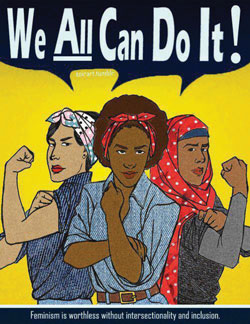In his address to the nation in March of 1980, American President Jimmy Carter stated, “From the first settlers who came to our shores, from the first American Indian families who befriended them, men and women have worked together to build this nation. Too often the women were unsung and sometimes their contributions went unnoticed. But the achievements, leadership, courage, strength and love of the women who built America was as vital as that of the men whose names we know so well.”
Women, ever since (and perhaps even before) the first foreign settlers came to America’s shores, have made giant strides and achievements in overcoming gender inequality through their various contributions to American society. However, how the month of March came to be celebrated and designated as Women’s History Month is quite an interesting story in and of itself.
It all began in the year 1981 when Congress passed Pub. L. 97-28, which authorized and requested that the President proclaim the week beginning March 7, 1982 as “Women’s History Week.” Congress continued to do the same for the next five years.
Next, in 1987, Congress passed Pub. L. 100-9, which designated the month of March 1987 as “Women’s History Month” after being petitioned by the National Women’s History Project. Just as they did before, for the next six years Congress continued to pass additional resolutions requesting and authorizing the President to proclaim March of each year as Women’s History Month. According to the Law Library of Congress, since 1995, Presidents Clinton, Bush and Obama have issued a series of annual proclamations designating the month of March as Women’s History Month.
Taylor Cavanaugh, a senior history and anthropology student, noted that it’s “important to know that women were important in history and fought for their rights.” She went even further to explain that history lessons in schools are mainly focused and based upon “political figures, [in which] women aren’t going to come up” or be given the same amount of time in a lesson compared to the males who have contributed and played key roles in history.
Catherine Bartch, an Instructor in the Political Science and Sociology Department who is also teaching a course on gender in politics, said, “Women always have been marginalized in a patriarchal [male dominated] society.” She continued, stating that Women’s History Month “celebrates the plight and sorrow as well as the achievements and accomplishments and to remind us how far we have come in bringing [female gender] equality to societies.”
Bartch also added, “[Women’s History Month] gives everyone the opportunity for at least a moment to stop, think, and take a deeper look at women’s struggles and achievements. It helps youth today learn about it and that we can’t take it for granted either.”
Cavanaugh also pointed out that since the United States is a world power and in some ways leads and impacts other countries, having an entire month dedicated to the achievements of women actually “might encourage recognition of women for other countries.”
However, when asked about the impact of Women’s History Month when it comes to limiting or helping with the remaining struggles of females in our society, Cavanuagh admitted that she isn’t sure of the significance that it plays on gender inequality.
Jarrett Walker, a junior political science student, shared similar thoughts. “[Women’s History Month is good for] raising awareness of gender inequality, but doesn’t solve the root cause of gender inequality.”
Regardless, Cavanaugh expressed that having a whole month dedicated to women’s history is “definitely an important step forward to gender equality.”
Katherine Parkin, an Associate Professor in the History and Anthropology Department, commented, “Women’s History Month is necessary because women have been oppressed throughout our history and still struggle for equality in this nation. Honoring the historical achievements of girls and women is one way to acknowledge that we have not done a good job in recognizing their contributions and participation in our society to date.”
IMAGE TAKEN from phdsandpigtails.wordpress.com




